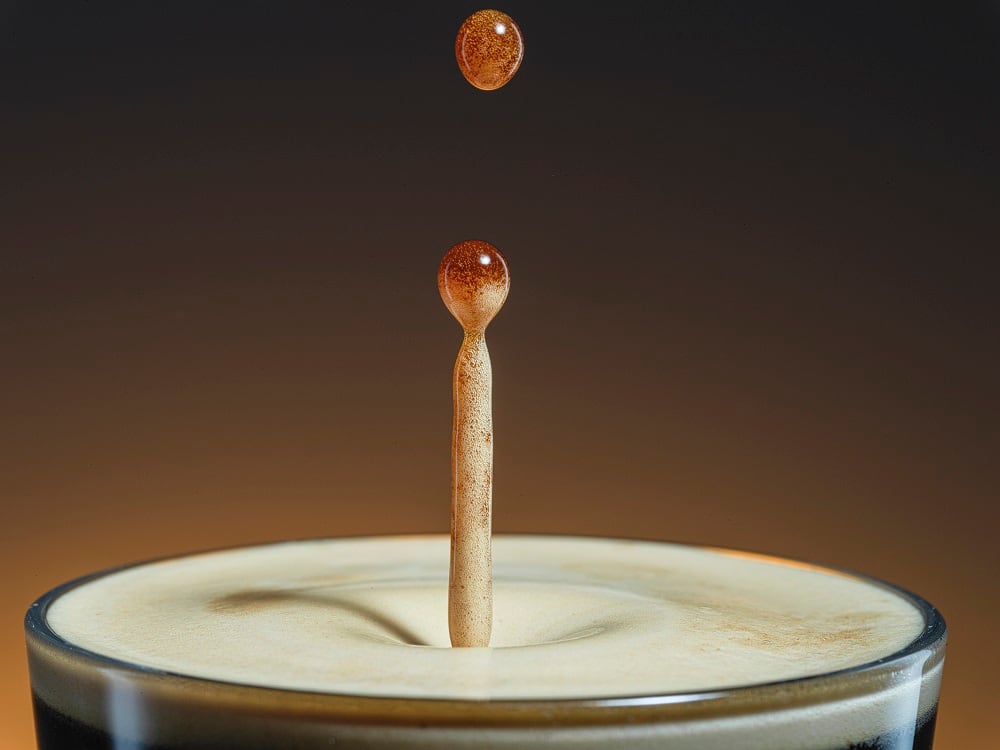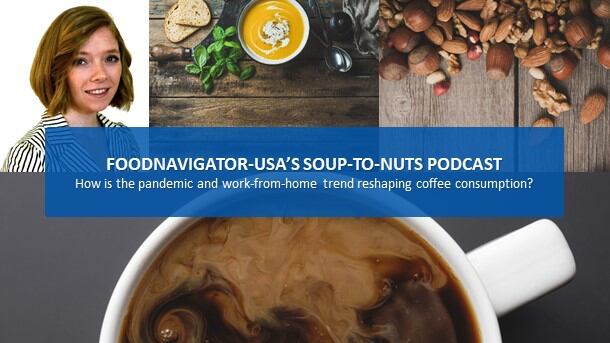Since raising $9 million in seed funding in 2020, Seattle start-up Atomo has expanded, rebranded, and is scaling up production of its ‘molecular coffee’. The company has replaced its pop art branding with a more sophisticated look, and aims to increase its current production volumes from around 1,000 cans of ‘reverse engineered’ coffee a day to 10,000 by the end of the year.
This would still be a drop in the ocean of global coffee consumption – around two billion cups are drunk every day around the world – but it would represent a “significant increase” for the start-up, said Charlie Shaw, director of innovation at the company, located a stone’s throw from coffee giant Starbucks’ headquarters.
Atomo has two ready-to-drink (RTD) canned products and is planning a soft launch in the first quarter of 2022, partnering with select companies and selling to their employees with “occasional opportunities” for direct-to-consumer sales in pop-up style events, Shaw said.
Its range includes Classic, described as a well-rounded medium roast cup with hints of cocoa, dark fruit and smoke, and Ultra Smooth, which has notes of natural caramel. Both have a balanced body, subtle bitterness and acidity, and 98% of the final product is made from upcycled ingredients, such as the date seeds from southern California.
Although Atomo’s initial focus is on the domestic US market, it has ensured its product formulations are compliant with Canadian and European Union food regulations, keeping the door open to future exports, and its product developers are currently busy working on a hot coffee product.
“When it comes to hot coffee, we are very focused right now on the consumer gesture and routine; something like a pour-over or drip machine and not necessarily for food service,” Shaw said.
What’s in a cup of molecular coffee?
Atomo creates its ‘molecular coffee’ by breaking down the components of coffee into five macroscopic properties that it aims to replicate: aroma, taste, texture, color, and bioactive molecules.
“We look at all five as being essential to coffee. If we are going to say our product is made without coffee beans but is coffee, then it has to match all those five,” Shaw told FoodNavigator-USA.
Once it has identified these macro properties, it uses a patented process to convert compounds from other ingredient sources into the same ones found in green coffee beans. Its current clean label formulation lists water, date seed extract, chicory root extract, grape skin extract, inulin, natural flavors, and caffeine as ingredients.
Atomo says that reverse engineering the taste of coffee allows it to create a flavor profile that people want; while coffee is undoubtedly a popular drink, many people find it too bitter, adding milk and sugar to hide this.
According to Shaw, the natural flavors provide “subtle adjustments” to the flavor profile, but most of the flavor, aroma, texture and color comes from the date seeds and chicory. Inulin is used to bulk up the texture, while the grape skin provides antioxidants.
Antioxidants from grapes, caffeine from tea
“Date seeds themselves have a high amount of polyphenols […] and we’ve been checking our antioxidant capacity, but coffee is a magical seed; it’s very tough to keep up with how much is crammed into that little bean,” said Shaw. “Using ORAC [a method for measuring antioxidant capacity], we find that our coffee doesn’t keep up with conventional coffee, which is one of the reasons we add the grape skin extract. Grapes and the skin and seeds have so many antioxidants, and we know how important those components in coffee are to some folks, so we try to cover all of them.”
Atomo’s natural caffeine extract, meanwhile, comes from green tea. Is this somewhat ironic given that a more obvious source would have been, well, coffee?
“We want to make sure that when we say it’s coffee with no beans, that is clear and unambiguous. At the same time, our focus here is on coffee that we can all continue to enjoy in the future. So, would we rule out in the future taking caffeine from the cascara or from caffeine extracted in the decaffeination process? No, not really,” Shaw said.
Historically, coffee has only ever been cultivated for the seeds, leaving the fruit of the coffee cherry, known as the cascara, as a by-product. Researchers in Indonesia estimate that between 40 and 45% of the coffee fruit goes to waste even though it contains potentially useful compounds, such as polyphenols and caffeine, making it an interesting target for upcycling.
“Ultimately, when you do those sustainability analyses, if it means we are not really contributing to any negative practices, then I’d say there’s an openness to [using cascara]. But, certainly at the start, we want to keep the message clear: this is coffee with no coffee in it whatsoever.”
As for how its ‘molecular coffee’ is actually made, the core of Atomo’s production process is very similar to that of conventional coffee, Shaw said. It takes its coffee ingredients, roasts and grinds them, and then extracts and filters, using only water as an extraction solvent.
“What’s different comes earlier. It comes from recognizing what is similar between coffee and date or coffee and inulin, and making some tweaks so that by the time they are in the roaster, we’ve set them up to be so much more like coffee,” he said.
A more sustainable brew
According to the start-up, there are compelling reasons to look for an alternative to coffee. Demand for coffee is growing, putting pressure on current land resources and fueling deforestation. A 2014 paper cites published data on coffee land-use change, showing that in nearly all countries where coffee production is expanding rapidly, deforested land is the primary source of new acreage.
Atomo therefore positions its coffee as a more sustainable alternative. It estimates that its coffee produces 93% fewer carbon emissions and uses 94% less water than conventional coffee.
“We don’t anticipate we will displace or kill off traditional coffee; we are trying to be an alternative to help meet that demand without causing damage. The bulk of what we put in our product is upcycled, so we’re not clearing any land to do it, and we are also not adding any demands onto the food system that aren’t already there. In essence, we are taking something that people regard as waste,” Shaw said.


